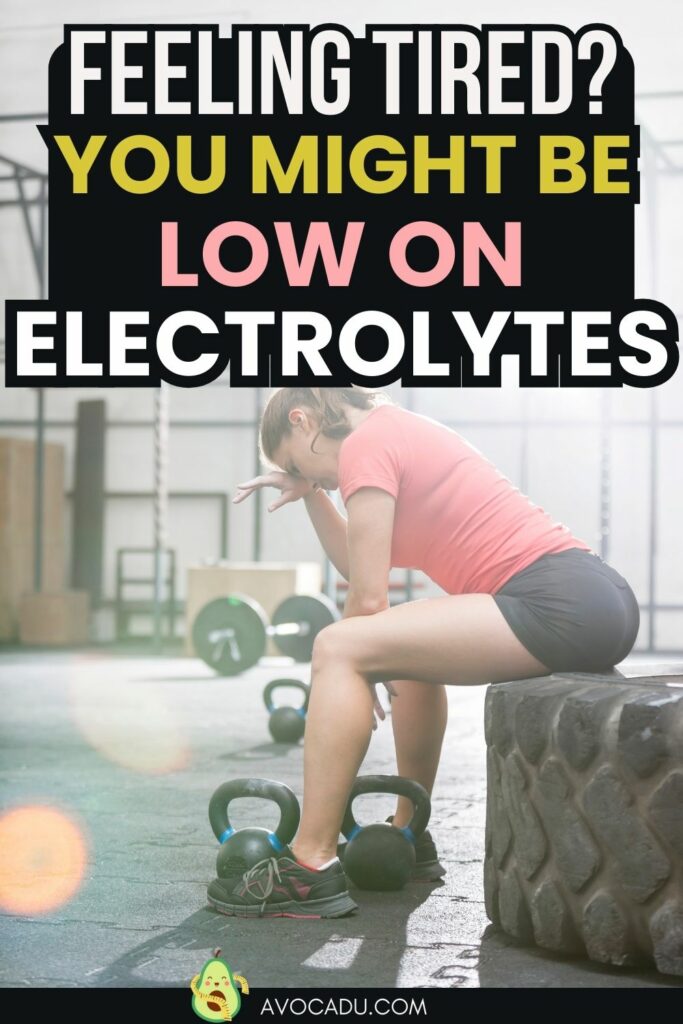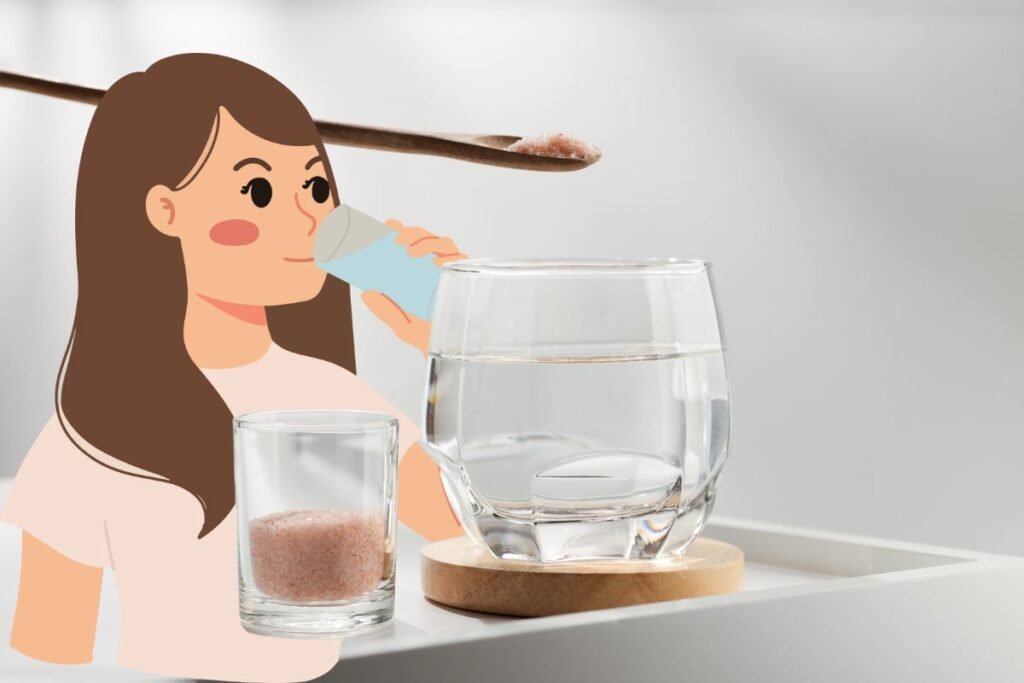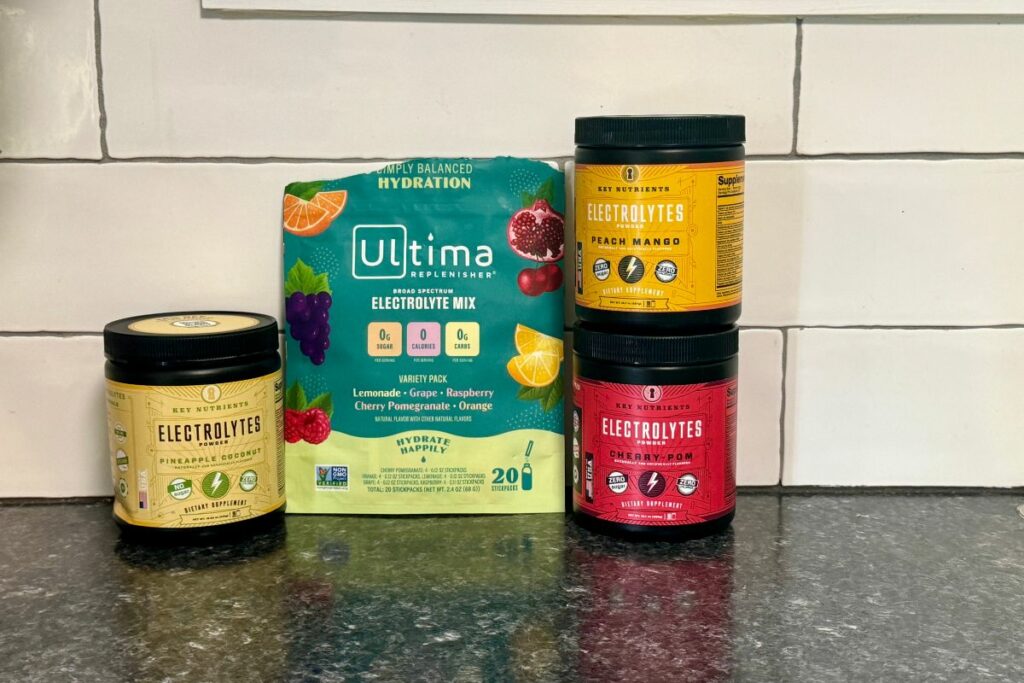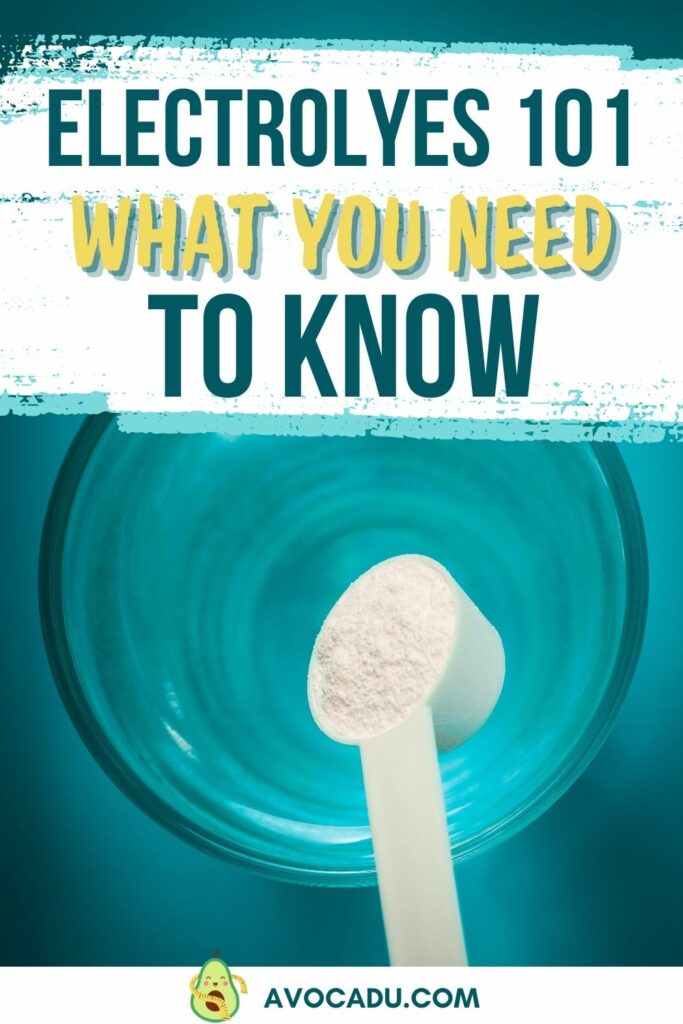Ever felt completely wiped out after a workout or a hot day outside? Maybe you’ve experienced muscle cramps or felt unusually tired even after drinking plenty of water.
Chances are, your electrolytes might be out of whack. These essential minerals play a crucial role in keeping your body functioning smoothly.
From staying hydrated to maintaining muscle function, electrolytes are key players in your overall health.
Keeping them in balance is essential for staying energized and feeling your best. Let’s take a look at what electrolytes are, why they matter, and how you can make sure you’re getting enough of them.

This post may contain affiliate links, which helps keep this content free. Please read our disclosure for more info.
What Are Electrolytes?
Electrolytes are minerals in your body fluids that carry an electric charge, enabling them to transmit signals between cells.
While most discussions focus on the three primary electrolytes—sodium, potassium, and magnesium—there are several other important electrolytes at play, including calcium, chloride, bicarbonate, and phosphate.
Each of these minerals plays a unique and vital role in maintaining your body’s overall function and health. Here’s a closer look at each electrolyte, including how deficiencies and excesses can affect you:
- Sodium: Sodium is vital for fluid balance within cells and assists in nutrient absorption. It’s the most abundant electrolyte in the body. Low sodium levels (hyponatremia) can lead to headaches, nausea, and mental confusion, whereas high sodium levels (hypernatremia) can cause high blood pressure, swelling, and intense thirst.
- Potassium: Potassium works alongside sodium to help cells function properly. It is crucial for heart health. When sodium enters a cell, potassium exits, and vice versa. Low potassium (hypokalemia) can cause muscle weakness, cramps, and irregular heart rhythms, while high potassium (hyperkalemia) can lead to severe heart problems and muscle fatigue.
- Magnesium: Magnesium is essential for converting nutrients into energy and is critical for brain and muscle function. A lack of magnesium (hypomagnesemia) can cause muscle cramps, mental disturbances, and heart palpitations. Excessive magnesium (hypermagnesemia) can lead to low blood pressure, nausea, and heart issues.
- Calcium: Calcium is important for more than just strong bones and teeth. It helps control muscle contractions, transmit nerve signals, and regulate heart rhythms. Low calcium levels (hypocalcemia) can cause muscle spasms, tingling in the fingers, and irregular heartbeats. High calcium levels (hypercalcemia) can lead to kidney stones, bone pain, and heart irregularities.
- Chloride: Chloride is the second-most abundant ion in the body and helps maintain fluid balance within cells. It also plays a role in regulating the body’s pH levels. Low chloride levels (hypochloremia) can cause metabolic alkalosis, leading to muscle twitching and breathing difficulties. High chloride levels (hyperchloremia) can result in metabolic acidosis, causing fatigue and dehydration.
- Phosphate: Phosphate is crucial for transporting chemical compounds and molecules outside your cells. It aids in nutrient metabolism and forms part of nucleotides, which are the building blocks of DNA. Low phosphate levels (hypophosphatemia) can lead to muscle weakness, bone pain, and respiratory issues. High phosphate levels (hyperphosphatemia) can cause calcification of tissues and organs, leading to cardiovascular problems.
- Bicarbonate: Bicarbonate is derived from carbon dioxide produced by your body, helping to maintain normal blood pH levels. A deficiency in bicarbonate (metabolic acidosis) can cause rapid breathing, fatigue, and confusion. Excess bicarbonate (metabolic alkalosis) can result in muscle twitching, hand tremors, and light-headedness.
Together, these electrolytes keep your muscles working, your heart beating, and your nerves firing. They are integral to a wide range of bodily functions, making it essential to maintain their balance for overall health and well-being.
Signs of Electrolyte Imbalance

When your electrolytes are off, your body lets you know in various ways. Recognizing these signs early can help you address any imbalances before they become serious health issues.
Low Electrolyte Levels (Deficiency)
If you’re low on electrolytes, you might experience a range of symptoms. Common signs include:
- Fatigue: Feeling unusually tired or lacking energy can be a sign that your body’s electrolyte levels are depleted.
- Dizziness: Low electrolytes can lead to dizziness or light-headedness, especially when standing up quickly.
- Muscle Cramps: Electrolytes play a key role in muscle function, so low levels can cause painful cramps or spasms.
- Irregular Heartbeat: Electrolyte imbalances can affect your heart’s electrical activity, leading to irregular heart rhythms or palpitations.
- Nausea and Vomiting: Low electrolytes can cause gastrointestinal symptoms like nausea and vomiting.
Low levels of electrolytes can happen due to excessive sweating, dehydration, certain medications (like diuretics), or medical conditions such as kidney disease.
Athletes, for instance, often lose significant amounts of electrolytes through sweat, making them more susceptible to imbalances.
Additionally, following a low-carb or keto diet can lead to low electrolytes because these diets increase water loss and reduce the intake of electrolyte-rich foods.
High Electrolyte Levels (Excess)
Too much of a good thing can be bad, and electrolytes are no exception. High levels might lead to:
- Weakness: Excess electrolytes can cause generalized weakness, making it difficult to perform everyday tasks.
- Confusion: High electrolyte levels can impact brain function, leading to confusion or difficulty concentrating.
- Irregular Heartbeat: Similar to low levels, high electrolyte levels can disrupt your heart’s rhythm, sometimes causing serious heart issues.
- Nausea: Overabundance of certain electrolytes can lead to nausea and digestive upset.
High electrolyte levels can result from taking too many supplements or due to underlying health conditions like chronic kidney disease, where the kidneys cannot properly filter out excess minerals.
Being aware of these symptoms and understanding their potential causes can help you manage and prevent electrolyte imbalances effectively.
Home Recipes for Electrolytes

You don’t always need to buy fancy drinks to get your electrolytes. Here are a couple of easy recipes you can make at home:
- DIY Electrolyte Drink: For a more comprehensive electrolyte replacement, mix water with a pinch of sea salt, a pinch of NoSalt (a potassium salt substitute), and a squeeze of lemon. This drink provides both sodium and potassium, essential electrolytes that help maintain fluid balance and support muscle function. The lemon adds a bit of flavor and a dose of vitamin C, making this an ideal homemade alternative to commercial sports drinks.
- Coconut Water: Often referred to as nature’s own electrolyte drink, coconut water is packed with potassium and offers a natural, slightly sweet taste. It’s an excellent option for rehydration, especially after a workout or on a hot day.
Homemade recipes are not only cost-effective but also allow you to control what goes into your body, avoiding the added sugars and artificial ingredients often found in store-bought electrolyte drinks.
Recommendations for Sugar-Free Electrolyte Brands

If you’re looking for ready-made options, there are some great sugar-free electrolyte brands out there. These products offer a convenient way to stay hydrated and maintain your electrolyte balance without added sugars or artificial ingredients. Here are a few top picks to consider:
Key Nutrients: Known for its great taste and high-quality ingredients, Key Nutrients Electrolyte Recovery Plus offers a well-rounded blend of essential electrolytes including sodium, potassium, magnesium, and calcium.
It also contains trace minerals and vitamins B6 and B12 to support energy and hydration. With no sugar, calories, or carbs, it’s an excellent choice for anyone looking to maintain their electrolyte levels while following a healthy diet.
Plus, it comes in various flavors, making it enjoyable to drink. Personally, I prefer Key Nutrients over Ultima due to its superior taste and effective formulation.
Learn more about Key Nutrients Electrolyte Recovery Plus
Ultima Replenisher: Ultima offers a variety of flavors and is completely free of sugar, calories, and carbs. It provides a balanced blend of six electrolytes: sodium, potassium, magnesium, chloride, calcium, and phosphorus, along with a mix of support minerals.
Ultima is designed to be a clean, effective hydration solution suitable for various dietary preferences, including vegan and keto.
It’s an excellent option for those seeking a mild-tasting electrolyte drink that can be consumed daily.
Learn more about Ultima Replenisher
LMNT: Popular in the keto community, LMNT is known for its clean ingredients and high sodium content. Each packet contains a hefty dose of sodium, potassium, and magnesium, designed to meet the needs of those on a low-carb or ketogenic diet who require higher levels of sodium.
LMNT is particularly beneficial for athletes and individuals who experience significant electrolyte loss through sweating. However, it has a very salty taste, which might be off-putting for some.
Saltt by Keto Chow: Another keto-friendly option, Saltt is well-regarded for its effectiveness and taste. It provides a balanced blend of sodium, potassium, and magnesium, catering to the specific needs of those on a ketogenic diet. Like LMNT, Saltt has a strong salty flavor, which may not be suitable for everyone.
When choosing a sugar-free electrolyte supplement, it’s important to consider your personal taste preferences and dietary needs.
While LMNT and Saltt are effective, I find them too salty tasting, which is why I prefer Key Nutrients and Ultima.
Keep Your Electrolytes in Check for Optimal Health

Electrolytes are more than just a buzzword—they’re crucial for your overall health. These essential minerals play a vital role in hydration, muscle function, nerve signaling, and maintaining your body’s pH balance.
By keeping your electrolytes balanced, you can stay hydrated, feel energized, and support your overall well-being.
Whether you choose to make your own electrolyte drinks at home or opt for convenient, sugar-free brands like Key Nutrients or Ultima, it’s important to ensure you’re getting enough of these vital minerals.
Homemade recipes can be a cost-effective and natural way to replenish your electrolytes, while commercial products offer the convenience and precision of pre-measured doses.
By paying attention to your electrolyte levels, especially if you’re on a low-carb or keto diet, you can prevent imbalances that could lead to fatigue, muscle cramps, and more serious health issues.
Incorporating the right balance of electrolytes into your daily routine is a simple yet powerful way to maintain your health and vitality.







